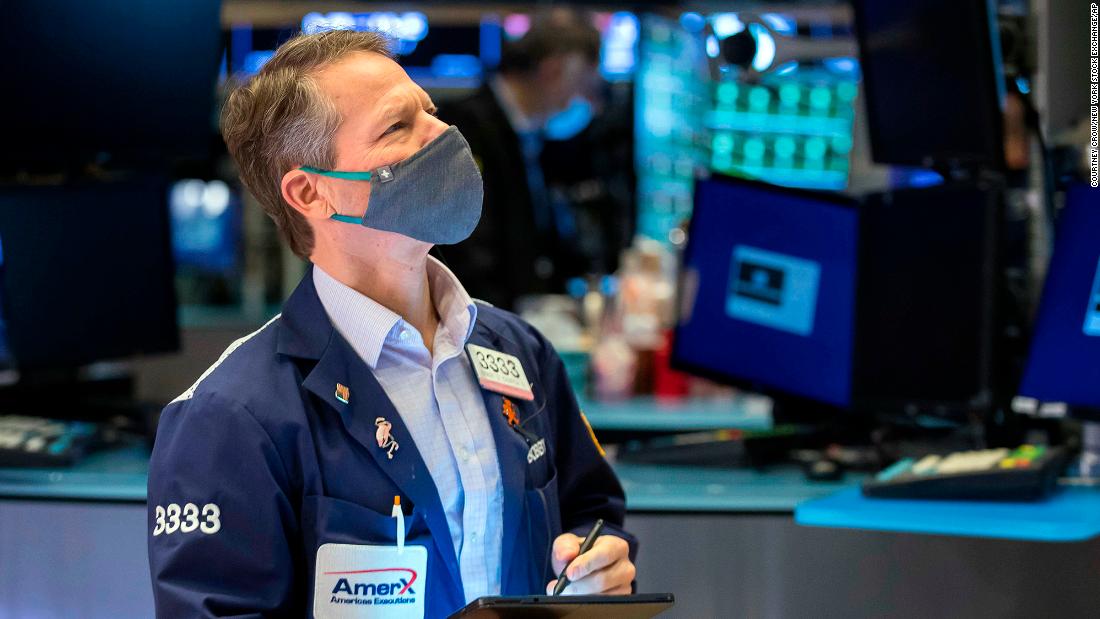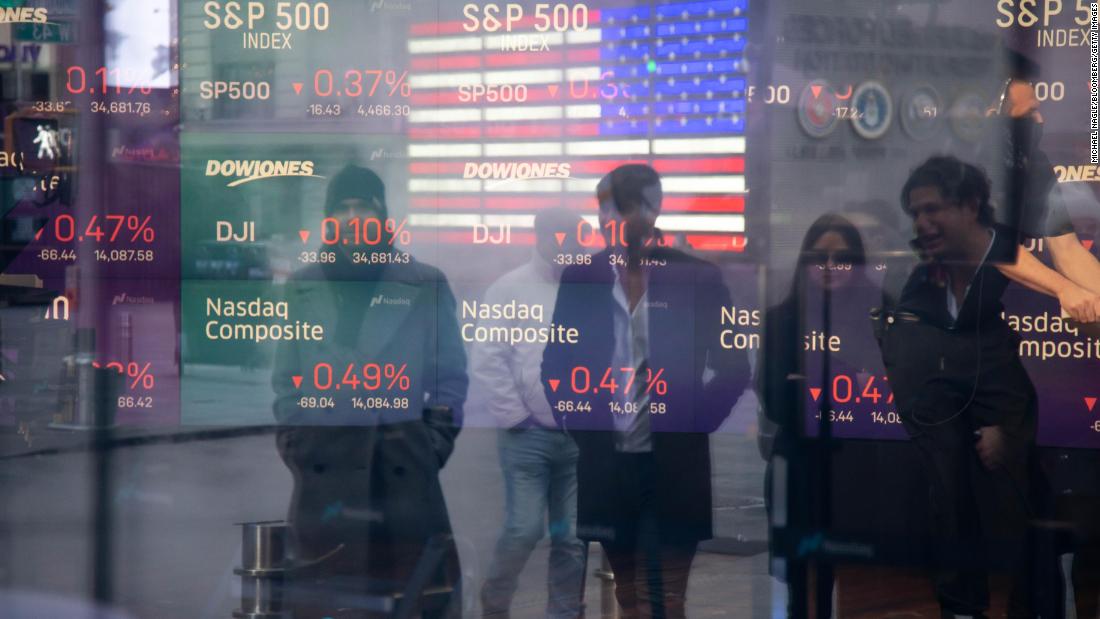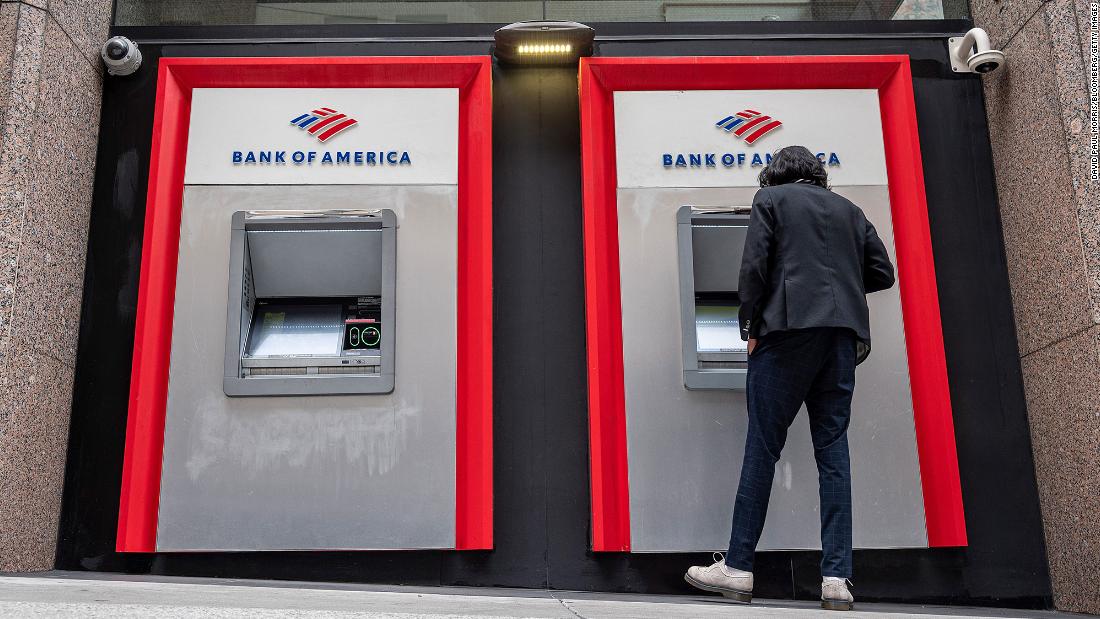Today’s news in 10 minutes
 ]
]
Story highlights This page includes the show Transcript
January 25, 2022
A violent crime wave rises in U.S. cities from coast to coast. The U.S. tells non-essential personnel to leave its embassy in Ukraine. A European astronaut discusses how some lessons learned on the International Space Station could be applied on Earth. And a photographer captures “ice pancakes” on Lake Michigan.
CNN 10 serves a growing audience interested in compact on-demand news broadcasts ideal for explanation seekers on the go or in the classroom. The show’s priority is to identify stories of international significance and then clearly describe why they’re making news, who is affected, and how the events fit into a complex, international society.
Thank you for using CNN 10
Stocks finish lower, dashing hopes for a turnaround Tuesday
 ]
]
New York (CNN Business) Investors better fasten their seat belts because there’s no sign of volatility letting up on Wall Street.
Stocks resumed their selloff for most of day, but the Dow offered a glimmer of hope for turnaround Tuesday when it briefly turned green in the afternoon.
But even though stocks ended off their lows, the major indexes all ended in the red.
Thefinished a moderate 0.2% or 67 points lower, having swung more than 1,000 points from high to low-point for the second straight session in a row.
Dow componentsandall posted strong outlooks in their earnings releases, helping lead the index back from its worst losses.
S&P 500 SPX Thefinished down 1.2% but again avoided the dreaded correction territory, defined as a 10% drop from the most recent peak. In the case of the S&P, that was just three weeks ago, when it hit a record high on January 3
Nasdaq Composite COMP The, which fell into correction territory last week, closed down 2.3%.
CBOE Volatility Index VIX , CNN Business’ The market’s volatility tracker, the, or Vix, also reflected the roller coaster-nature of the day and ended up 2.2%, having recovered from its earlier double-digit percentage jump. Amid all thisCNN Business’ Fear and Greed Index fell solidly into “fear” mode Tuesday, as investors grew worried about the Fed’s policy changes and global politics.
Stocks climbed almost unabated in 2021, and some experts believe the market was due for a pull-back as stocks got expensive. On Monday, the Dow fell more than 1,000 points at its lowest point but finished in the green thanks to a last minute reversal just before the market closed
“Recent price action suggests the long overdue equity market correction has finally begun. In our view, this is a healthy long-term development,” said Steven Ricchiuto, US chief economist at Mizuho Securities.
For value hunters, the recent selloffs might present an opportunity “to begin nibbling at some of the more beaten down areas of the market,” he added.
What’s driving markets
Investors have a lot on their plate right now.
The Federal Reserve’s meeting is kicking off ahead of Wednesday’s policy decision. Although Fed Chairman Jerome Powell hasn’t made a secret of the central bank’s plans to roll back stimulus and raise interest rates this year, it’s stressing investors out.
The central bank in December signaled multiple rate hikes in 2022 and expectations settled on three one-quarter percentage point increases. But since then, the market has shifted its expectations to as many as four hikes.
Treasury bond yields, which track interest rate expectations, ticked higher on Tuesday, with the 10-year bond yielding 1.79% at the time of the stock market close. Last week, the yield had climbed above 1.8% for the first time since the pandemic started, signaling that the market is gearing up for a rising interest rate world.
The Fed’s expected actions come in response to rampant pandemic-era inflation. Economists and investors worry when will prices have soared so much that Americans stop spending – a terrible sign for the recovery.
Consumer confidence fell slightly in January, data from The Conference Board showed Tuesday, but it was still better than economists had expected. American’s view of the present situation improved even though short-term growth expectations declined.
“Concerns about inflation declined for the second straight month, but remain elevated after hitting a 13-year high in November 2021,” said Lynn Franco, senior director of economic indicators at The Conference Board. “Concerns about the pandemic increased slightly, amid the ongoing Omicron surge.”
With earnings season in full swing, investors want to hear how much of the production price increases companies can pass onto their consumers.
Why Biden should be worried about the stock market
 ]
]
New York (CNN Business) President Joe Biden’s honeymoon with the stock market is over.
The Nasdaq, despite its historic rebound on Monday , finished sharply lower on Tuesday and is on track for its worst month since 2008 and its worst January ever.
It bears reminding ourselves that the stock market is not the economy . The fact that high-flying tech stocks on Wall Street have succumbed to gravity doesn’t change the facts that unemployment is very low , demand for workers is high and wages are rising.
Yet this is not merely a Wall Street problem. Main Street would be threatened by a more serious market downturn, and that would spell political trouble for Biden, whose approval ratings have been hurt by very high inflation.
“The economy and markets are intertwined. A sharp drop in the stock market will impact economic activity. They are all in the same bed together,” said Peter Boockvar, chief investment officer at Bleakley Advisory Group.
The risk is that the market’s turmoil spills over into the real economy, erasing trillions of dollars in household wealth.
Moreover, further losses on Wall Street threaten to dent already shaky confidence among consumers, who have more exposure to stocks than they used to. If your nest egg just got 20% smaller, do you hold off on booking that vacation? Or buying a new car (assuming you can find one )? Maybe so.
“There is a real threat to Main Street. The Fed is trying to raise rates to ease inflation, but not choke off economic growth. It’s a very fine balance,” said Kristina Hooper, chief global market strategist at Invesco.
At the same time, market stress can make it harder for companies to raise money in capital markets that had been wide-open until very recently.
“A sustained selloff in the stock market starts to catch people’s attention and does affect confidence over time,” said Ethan Harris, head of global economics at Bank of America. “The average person judges the economy by a few statistics. One of them is the Dow Jones Industrial Average.”
Americans are more exposed to market turmoil today
It’s true that the fortunes of the rich are more closely tied to the stock market than the middle class, whose wealth is linked more to home values, which are way up during Covid.
The richest 10% of US households held a staggering 88% of all corporate stock and mutual fund wealth as of the third quarter of last year, according to the Federal Reserve.
Yet stocks represent a greater chunk of the average American’s net worth than they used to.
Households in the 50% to 90% wealth range held $4.3 trillion in stocks and mutual funds as of last year, representing 9.4% of their net worth, according to the Fed. That’s up from just $1.6 trillion and 6.4% a decade ago. In 1991, stocks made up just 4.7% of this group’s wealth.
Likewise, the bottom 50% of US households held $260 billion in stocks and mutual funds, comprising 2.9% of their wealth. That’s up from $90 billion and 1.8% of their wealth a decade ago.
Asked about the recent market drop, a White House official told CNN the administration focuses on trends in the economy, not any single indicator. The official pointed to “real progress” demonstrated by the 3.9% unemployment rate and jobless claims that have declined by about two-thirds from a year ago, when the unemployment rate was 6.4%.
“Unlike his predecessor, President Biden does not look at the stock market as a means by which to judge the economy,” the White House official said, alluding to former President Donald Trump’s well-chronicled obsession with the Dow as the ultimate barometer of economic success.
Economists are on high alert for signs that the stock market stress is infecting the broader capital markets that keep the economy humming.
Yields in the junk bond market have begun to creep higher. A spike would make it more expensive or impractical for leveraged companies to refinance their debt. And that would have a real and immediate economic impact.
Markets have been ‘quite complacent’
The good news is that stocks haven’t yet fallen sharply enough to alarm economists.
The S&P 500 is flirting with a 10% correction from prior highs. Such drops are viewed as healthy after sharp rallies.
“What would make us nervous would be a 15% to 20% drop in markets that is sustained,” said Bank of America’s Harris.
The S&P 500 is nowhere near the 20% threshold required to be considered a bear market, although the Nasdaq got close to that on Monday before rebounding.
“We’ve got a long way to go. I don’t think it’s impossible though,” said Harris. “Clearly, the markets have been quite complacent about the Fed. And the Fed has contributed to that by downplaying the risks and describing inflation as transitory.”
The market stress began earlier this month after the minutes from the December Fed meeting revealed officials are stepping up their efforts to fight inflation by removing the easy-money punch bowl that has juiced the stock market.
That did not set well with investors, who have become accustomed to unprecedented support from the Fed. Near-zero rates, combined with massive Fed purchases of bonds, forced investors to bet on risky assets like stocks. Now, the reverse is happening.
“The Fed is in an impossible spot, one that they put themselves in,” said Boockvar. “They are the architects of this relationship. Now they have to deal with the so-called break-up.”
Soaring tensions between Russia and Ukraine have only added to the stress on Wall Street.
Why the Fed isn’t freaking out
Fed officials, gathering for this week’s regularly scheduled policy meeting, are likely not freaking out about the market turmoil. At least not yet.
Mark Zandi, chief economist at Moody’s Analytics, said the market retreat is a feature, not a bug, of the Fed’s shift to inflation-fighting mode.
“So far, I view this as therapeutic,” Zandi told CNN. “The Federal Reserve wants and needs the economy to cool off, otherwise it will blow past full employment and inflation will become a persistent problem.”
Keep in mind that the Fed regularly speeds up and slows down the real economy in large part by influencing financial markets. Lowering rates supports growth by making it easy to borrow and boosting risky assets. And vice versa.
Despite the recent losses, markets remain significantly higher during the Covid era. Even at Monday’s intraday low of 4,222, the S&P 500 was trading 93% above its low in March 2020 when the nation began shutting down.
To be sure, stocks can’t go straight up forever. A recalibration makes sense given the Fed’s shift in its policy.
“The market got ahead of itself. It got overvalued, bordering on frothy,” said Zandi. “As rates rise, bubbles are coming out.” But he added that a 20% to 25% decline in stocks would become more problematic for the real economy.
“That could cause damage that you don’t want to see,” Zandi aded. “It’s tricky because the market can take on a life of its own.”
First on CNN: Bank of America is giving workers $1 billion of stock
 ]
]
New York (CNN Business) Bank of America is handing out $1 billion worth of restricted stock to virtually its entire workforce as the bank seeks to gain an upper hand in the war for talent.
In a memo shared exclusively with CNN, Bank of America CEO Brian Moynihan said Tuesday the company is for the first time opening up its stock awards program to lower-level employees who make up to $100,000 a year. In the past, those employees received a one-time cash bonus.
Bank of America BAC said each eligible employee will receive between 65 and 600 restricted stock units, corresponding with their compensation. Those units will vest over four years beginning in 2023.
At a minimum, that means frontline workers like bank tellers will receive restricted shares that are valued, on paper, at about $2,900 based on Bank of America’s current share price of $45.
At the upper end, higher-salary employees would get restricted shares valued at around $27,000.
Read More
So many people want a Ford Maverick that Ford’s stopped taking orders
 ]
]
(CNN) If you want a Ford Maverick pickup but haven’t placed an order already yet, time’s running out. On Thursday, Ford will stop accepting any new retail orders for the 2022 model year Maverick, company spokesman Michael Levine said in an email. After that, buyers will have to wait until order banks open for the 2023 model year this summer.
The halt specifically applies to “retail orders,” though, so government and business fleet buyers will still be allowed to order trucks after Thursday. Ford did not say how many Maverick orders the automaker has already collected.
automakers have been dealing with Across the industry,automakers have been dealing with problems getting needed parts to make vehicles, particularly computer chips. Ford did not specifically cite any particular production issues with the Maverick, though.
The cause of the halt on orders could be combination of factors, said Brian Moody, executive editor at Autotrader.com.
“I wonder if it’s not a little bit more popular than they expected combined with continuing supply change issues,” he said.
Read More
